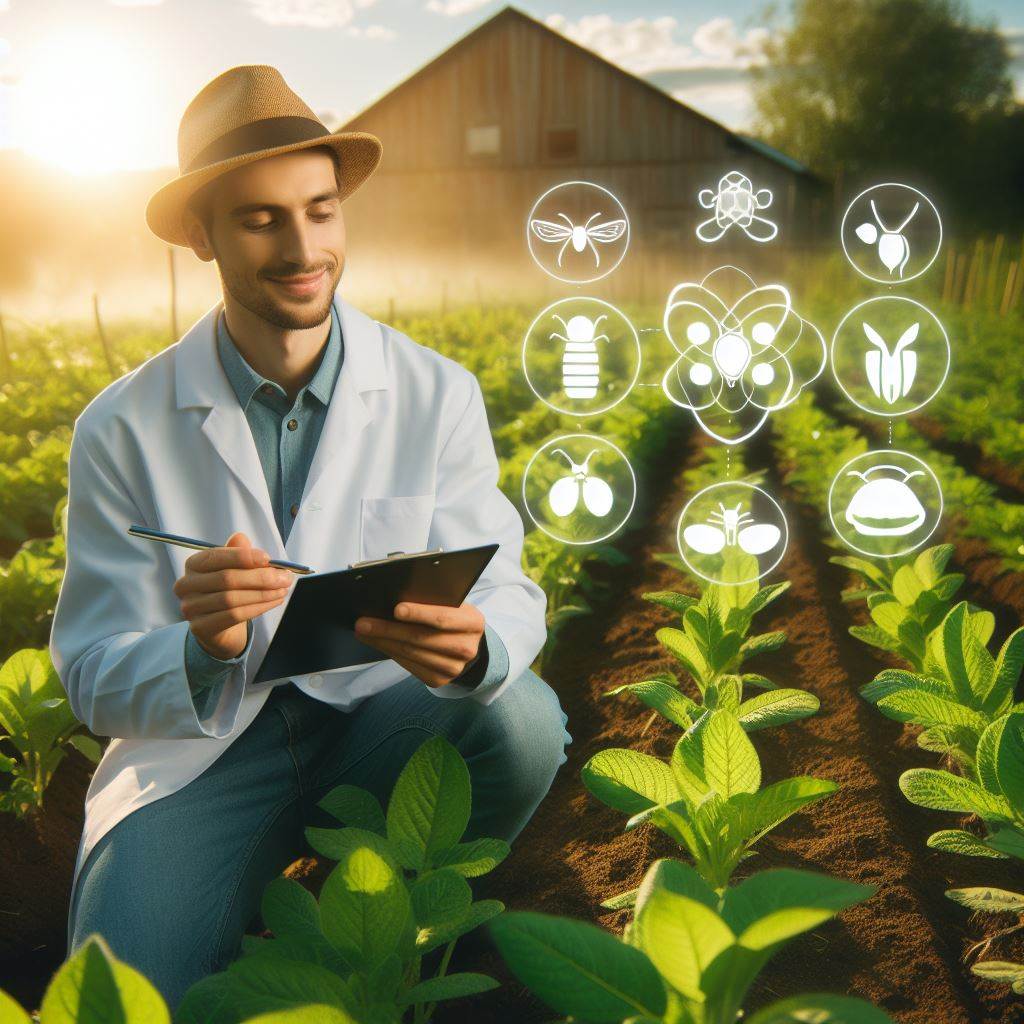Introduction
Importance of eco-friendly pest control in modern farming
Eco-friendly pest control plays a crucial role in modern farming for various reasons.
Eco-friendly pest control in modern farming is vital for preserving ecosystems, safeguarding human health, and promoting sustainable agriculture.
By minimizing reliance on harmful chemicals, it fosters a balanced environment, enhances biodiversity, and ensures long-term viability of agricultural systems while maintaining economic viability for farmers.
Definition of eco-friendly pest control
Eco-friendly pest control refers to methods that minimize harm to the environment and human health.
Eco-friendly pest control involves the use of natural or non-toxic methods to manage pests while minimizing harm to the environment, humans, and non-target species.
It encompasses techniques such as biological control, cultural practices, botanical extracts, and integrated pest management to maintain ecological balance and agricultural sustainability.
Purpose of the blog post
The purpose of this blog post is to showcase the significance of eco-friendly pest control in modern farming.
The negative impacts of conventional pest control methods
Conventional pest control methods have long been employed in farming to combat pests and protect crops. However, the significant negative impacts associated with these methods have raised concerns about their sustainability and environmental effects.
In this section, we will discuss the drawbacks of conventional pest control methods, emphasizing chemical pesticides and genetic modification of crops.
Chemical pesticides
Effect on human health
Chemical pesticides used in conventional pest control have been linked to various health problems in humans. Due to their toxic nature, exposure to these pesticides can lead to acute and chronic illnesses.
Prolonged contact or ingestion of these chemicals may result in respiratory issues, reproductive disorders, neurological damage, or even cancer.
Harmful effects on the environment
Chemical pesticides not only pose risks to human health but also cause considerable harm to the environment. When sprayed on crops, these pesticides can contaminate surrounding soil and water sources.
They seep into groundwater, affecting the quality of drinking water and harming aquatic life. Additionally, pesticide residues can accumulate in the food chain, leading to adverse effects on non-target organisms, including beneficial insects, birds, and wildlife.
Genetic modification of crops
Potential risks and unknown long-term effects
Genetic modification has been heavily employed in modern farming to enhance crop resistance against pests. However, concerns have been raised regarding potential risks associated with genetically modified (GM) crops.
The long-term effects of consuming GM crops are still uncertain and require extensive research. Some critics argue that genetically modifying crops may disrupt ecosystems, harm biodiversity, and have detrimental effects on human health.
Transform Your Agribusiness
Unlock your farm's potential with expert advice tailored to your needs. Get actionable steps that drive real results.
Get StartedIn light of the negative impacts discussed above, there is a growing need for eco-friendly pest control methods in modern farming. These methods aim to minimize the use of chemical pesticides and promote sustainable agricultural practices.
Let’s explore some effective alternatives in the following sections.
To summarize, conventional pest control methods, including the use of chemical pesticides and genetic modification, have significant drawbacks.
They pose risks to human health, contaminate the environment, and raise concerns about long-term effects.
Adopting eco-friendly pest control practices not only mitigates these negative impacts but also ensures the sustainability of farming and the well-being of both humans and the environment.
Read: Resilient Crops: Adapting to New Climates
Exploring eco-friendly pest control methods
Integrated Pest Management (IPM) approach
Integrated Pest Management (IPM) is an eco-friendly approach to pest control in modern farming. It aims to minimize the use of chemical pesticides while effectively managing pest populations.
By combining various pest control strategies, IPM promotes long-term sustainability and reduces environmental risks.
Definition and principles
IPM is a comprehensive approach that focuses on preventing and managing pests through biological, cultural, mechanical, and chemical control methods. It emphasizes the use of non-toxic or low-toxicity alternatives to conventional pesticides.
The principles of IPM include:
Identifying and monitoring pests to determine their population levels and potential risks.
Implementing preventive measures, such as proper sanitation, crop rotation, and selecting pest-resistant varieties.
Using biological control methods, such as introducing natural predators or parasites to control pest populations.
Resorting to chemical control only when necessary, and using selective, targeted pesticides with the least impact on beneficial organisms.
Evaluating the effectiveness of pest control strategies and making adjustments accordingly.
Components of IPM
IPM consists of several key components, each playing a crucial role in managing pests effectively:
- Monitoring and identification of pests: Regular monitoring allows farmers to identify pest species, assess their population levels, and determine the appropriate control measures.
- Prevention and cultural control methods: Preventive measures, such as crop rotation, proper irrigation, and removing pest habitats, help create an unfavorable environment for pests.
- Biological control: Biological control methods utilize natural enemies of pests, such as predators, parasites, or pathogens, to regulate pest populations.
- Chemical control as a last resort: Chemical control should only be used as a last resort, when other control methods have proven inadequate. Selective pesticides and proper application techniques minimize harm to non-target organisms.
Organic farming practices
Organic farming is another eco-friendly approach to pest control that emphasizes natural and sustainable methods. It promotes biodiversity, soil health, and ecosystem balance while minimizing chemical inputs.
Utilizing natural predators and beneficial insects
Organic farmers often encourage the presence of natural predators and beneficial insects to control pests. For example, ladybugs and lacewings feed on aphids and other common pests, reducing the need for chemical intervention.
Crop rotation and diversification
Crop rotation and diversification are important practices in organic farming. Planting different crops in sequential seasons helps break pest life cycles and reduces the buildup of pest populations.
Use of natural repellents and botanical extracts
Organic farmers utilize natural repellents, such as neem oil or garlic spray, to repel pests. They also make use of botanical extracts with insecticidal properties, like pyrethrum derived from chrysanthemum flowers.
Overall, eco-friendly pest control methods like IPM and organic farming practices show great promise in modern agriculture.
By reducing reliance on chemical pesticides, promoting ecological balance, and preserving biodiversity, these approaches contribute to a more sustainable and environmentally friendly farming industry.
Read: Organic Pest Control: Effective and Safe

Benefits of eco-friendly pest control in modern farming
Reduced environmental impact
Preservation of biodiversity
Eco-friendly pest control in modern farming offers several benefits, particularly in terms of reducing its environmental impact. One significant advantage is the preservation of biodiversity.
Showcase Your Farming Business
Publish your professional farming services profile on our blog for a one-time fee of $200 and reach a dedicated audience of farmers and agribusiness owners.
Publish Your ProfileBy using organic methods to control pests, farmers avoid the use of toxic chemicals that can harm beneficial insects, birds, and other wildlife. This helps maintain a balanced ecosystem within the farm.
Protection of water and soil quality
Another vital environmental benefit of eco-friendly pest control is the protection of water and soil quality. Conventional pesticides can contaminate water sources through runoff, affecting aquatic life and even human health.
Eco-friendly methods, such as crop rotation, natural predators, and biopesticides, significantly reduce the risk of water pollution.
Improved human health and safety
Minimizing exposure to harmful chemicals
Choosing eco-friendly pest control practices in modern farming also contributes to improved human health and safety. By minimizing the use of harmful chemicals, such as synthetic pesticides, farmers reduce their exposure to toxic substances.
This, in turn, lowers the risk of acute and chronic health conditions caused by prolonged contact with these substances.
Decreased health risks for farmers and consumers
Furthermore, eco-friendly pest control methods diminish health risks for consumers. When consuming produce grown with organic pest control techniques, people avoid ingesting residues of pesticides that might be present in conventionally grown crops.
This is particularly important for vulnerable groups such as pregnant women, children, and individuals with sensitivities or compromised immune systems.
Economic advantages
Cost-effectiveness of long-term pest management
Eco-friendly pest control also provides economic advantages for modern farmers. Firstly, adopting long-term pest management strategies proves to be cost-effective over time.
While organic pest control methods might require investment initially, they offer long-lasting solutions that reduce the need for constant pesticide application, saving farmers money in the long run.
Access to markets demanding organic produce
Additionally, practicing eco-friendly pest control allows farmers to access markets that demand organic produce.
With growing consumer awareness about the environmental and health benefits of organic farming, there is an increasing demand for pesticide-free crops.
By adhering to eco-friendly practices, farmers can meet this demand and capitalize on higher prices and market opportunities for their organic products.
In essence, embracing eco-friendly pest control in modern farming brings significant benefits. It reduces the environmental impact by preserving biodiversity and protecting water and soil quality.
Moreover, it improves human health and safety by minimizing chemical exposure and lowering health risks for farmers and consumers.
Lastly, it offers economic advantages such as cost-effectiveness and access to markets demanding organic produce. By implementing these practices, farmers can contribute to a sustainable and thriving agricultural system.
Read: IPM Basics: A Starter Guide for New Farmers
Success stories and case studies
In the pursuit of sustainable farming, eco-friendly pest control methods have proven to be effective in reducing the negative impacts of conventional chemical pesticides on the environment and human health.
Farmers around the world are increasingly adopting these methods and have achieved remarkable success in both crop yields and farm sustainability.
Examples of farmers adopting eco-friendly pest control methods
Increased crop yields and quality
One inspiring success story comes from a farmer who decided to implement integrated pest management (IPM) techniques.
By using a combination of various pest control strategies, such as crop rotation, natural predators, and trap crops, the farmer effectively minimized pest damage while maximizing crop yields.
Additionally, the implementation of IPM resulted in improved crop quality, leading to higher profits in the market.
Positive impact on farm sustainability
Another farmer chose to embrace biological control methods, which focus on utilizing beneficial organisms to control pests. This farmer minimized the use of chemical pesticides, thereby reducing pollution and protecting natural resources.
By encouraging a balanced ecosystem, the farmer not only achieved successful pest control but also preserved biodiversity on the farm. This approach has created a more sustainable farming system that can thrive in the long run.
Lessons learned and best practices
Importance of knowledge sharing among farmers
Farmers adopting eco-friendly pest control methods have recognized the significant importance of sharing knowledge and experiences with their peers.
Through farm visits, workshops, and online platforms, farmers exchange valuable information on successful techniques, challenges faced, and the overall benefits of eco-friendly pest control.
This collaborative approach facilitates the diffusion of knowledge and accelerates the adoption of sustainable practices throughout the farming community.
Collaborating with researchers and agronomists
Another key lesson learned is the essential role of collaboration with researchers and agronomists. These experts provide farmers with scientific insights, guidance, and technical assistance.
By working closely with scientists, farmers can access cutting-edge research findings, innovative pest management methods, and tailored recommendations.
Such collaborations empower farmers to make informed decisions and effectively implement eco-friendly pest control strategies, further optimizing their farming practices.
In summary, the success stories and case studies of farmers adopting eco-friendly pest control methods demonstrate the effectiveness and benefits of sustainable approaches in modern farming.
Increased crop yields, improved crop quality, and enhanced farm sustainability are all achievable outcomes.
The importance of knowledge sharing among farmers and collaborations with researchers and agronomists cannot be overstated in this journey towards a more eco-friendly and resilient agricultural sector.
Through the continued exploration and implementation of these practices, modern farming can thrive while minimizing its ecological footprint.
Read: The Role of Mulching in Water Conservation
Conclusion
Recap of the importance of eco-friendly pest control in modern farming
Eco-friendly pest control plays a crucial role in sustainable agriculture by protecting crops without harming the environment.
Eco-friendly pest control in modern farming prioritizes environmental and human health while managing pests effectively. It reduces reliance on chemical pesticides, fosters biodiversity, and sustains ecosystems.
Through practices like biological control and integrated pest management, it promotes sustainable agriculture, ensuring long-term productivity and ecological balance.
Encouragement for farmers to transition to sustainable practices
It is essential for farmers to adopt eco-friendly pest control methods to ensure long-term food security and environmental sustainability.
Transitioning to sustainable farming practices benefits farmers, the environment, and communities. Embrace eco-friendly pest control, soil conservation, and crop diversification.
Explore innovations in technology and collaborate with experts. By prioritizing sustainability, farmers ensure long-term viability, protect natural resources, and contribute to healthier ecosystems and resilient food systems for future generations.
Final thoughts on the future of eco-friendly pest control in agriculture
The future of farming lies in the hands of farmers who embrace eco-friendly pest control, leading the way towards a greener and healthier planet.
Showcase Your Farming Business
Publish your professional farming services profile on our blog for a one-time fee of $200 and reach a dedicated audience of farmers and agribusiness owners.
Publish Your Profile



